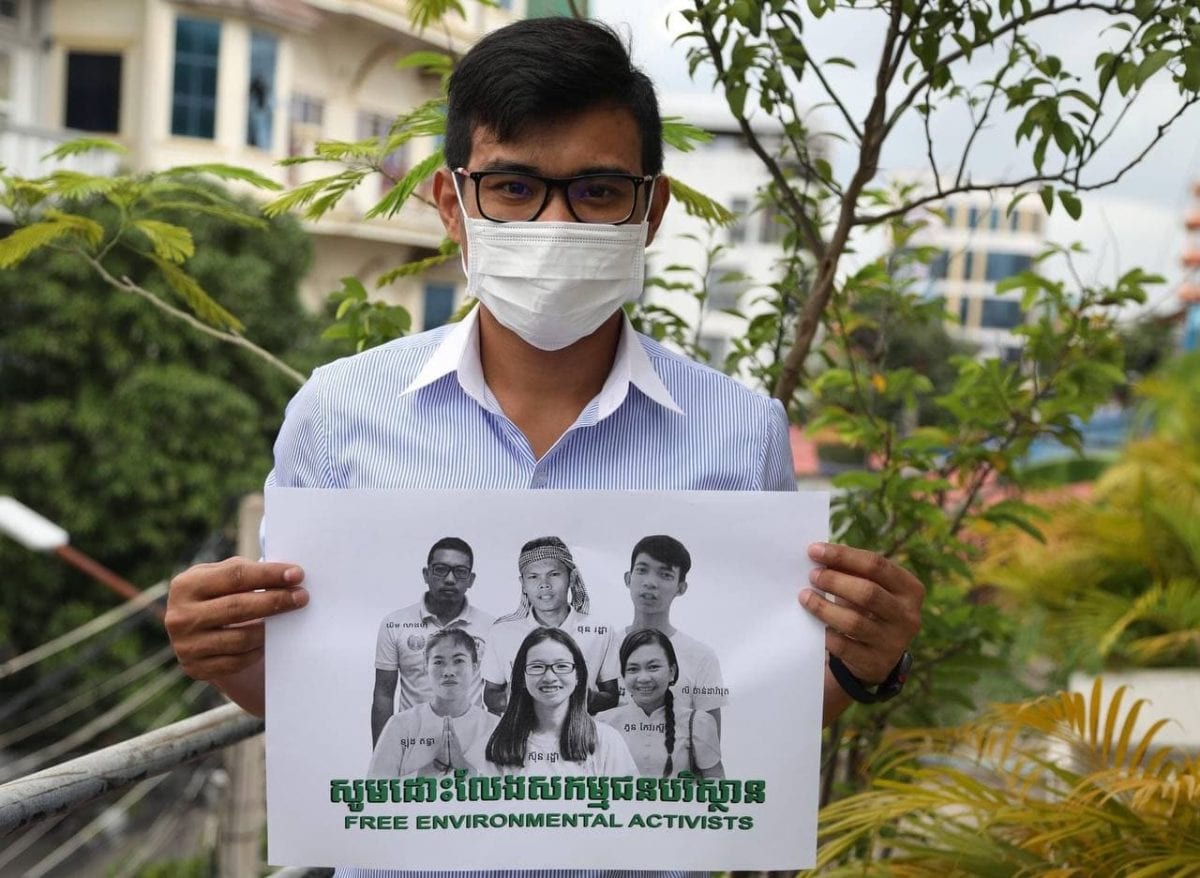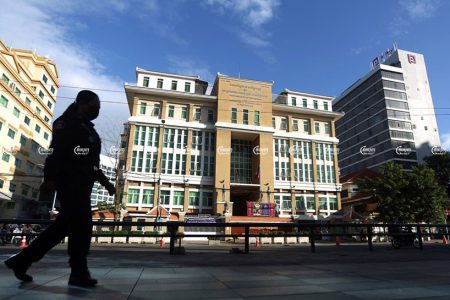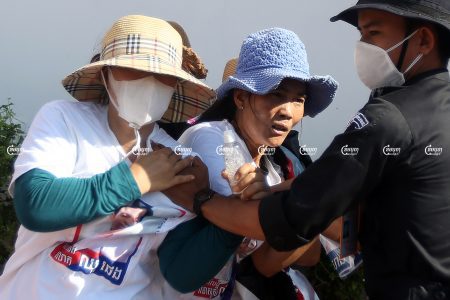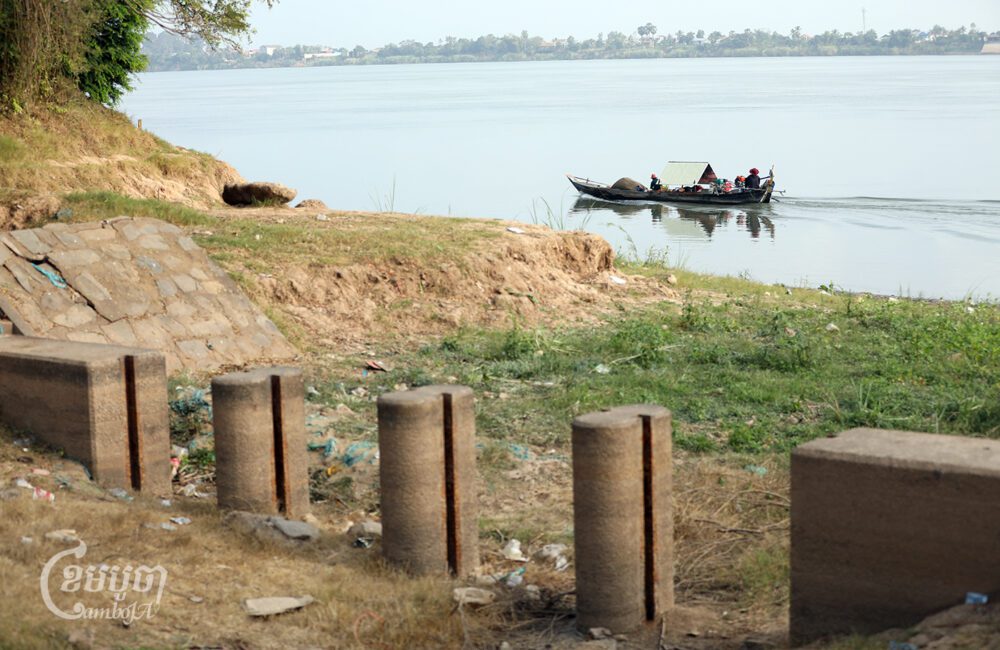The UN Human Rights Office and the UN Environment Programme on Wednesday expressed their concern over the arrest and detention of environmental human rights defenders in Cambodia after authorities arrested three activists from environmental group Mother Nature on June 16. According to the statement, at least 24 human rights defenders, 12 of whom are women, are currently in detention in Cambodia.
“We are living in the midst of an environmental crisis,” said Dechen Tsering, the UN Environment Programme’s Asia-Pacific regional director. “Civil society which peacefully advocates for the environment is a fundamental partner in addressing the challenges of climate change, biodiversity loss and pollution.”
Environmental activists Sun Ratha and Yim Leanghy were arrested on June 16 and later charged with both plotting and insulting the king. Another activist, Ly Chandaravuth, was charged only with plotting. All three youths are now in pretrial detention at Prey Sar prison’s CC1 and CC2. Mother Nature co-founder and Spanish national Alejandro Gonzalez-Davidson, who remains abroad, was also charged with plotting and insulting the king.
The charge of plotting is based on article 453 of the criminal code, and carries a sentence of five to 10 years. For the charge of insulting the king, the activists are facing between one and five years in prison.
Cynthia Veliko, the Southeast Asia representative for the UN Human Rights Office in Bangkok, said that it was essential that the Cambodian government halt its punitive actions against human rights defenders.
“We urge the authorities to ensure that human rights and civil society organizations in Cambodia can operate without fear and intimidation and that their rights to freedom of expression, peaceful assembly and association are protected and respected,” she said.
Last week, civil society groups, human right defenders and other environmental activists began a social media campaign calling for the release of the six Mother Nature activists who have been arrested over the past year. Thon Ratha, Long Kunthea and Phuon Keoreaksmey were arrested in September last year over social media posts about plans for Kunthea to march to the prime minister’s house to raise awareness about the environmental impacts of infilling Boeng Tamok lake in northwestern Phnom Penh for a development project. The three were sentenced in May to 20 months in prison on incitement charges.
Heng Sros, a forestry activist in Cambodia, said that based on his monitoring, the government’s actions against the activists would discourage young people from working to protect the environment.
“This measure seems intended to threaten the spirit of new youths or activists,” he said. “That this is the result — that they worked hard for their society, and they do not receive any benefit but they were detained in prison and charged with many crimes.”
As a forestry activist, he said, he was never shocked by the government’s measures because in Cambodia, people who worked for the betterment of society had no choice but imprisonment, death or fleeing the country.
“I do not know how police officials investigate, and how they find evidence to charge them with plotting,” he said. “I still do not believe that three youths can topple the government.”
“The authorities should stop arresting young people who work for or love society or forestry or the environment because it does nothing to benefit the government other than to discredit the government for not respecting human rights,” he said.
Sam Sokong, the three activists’ lawyer, said that the work his clients had been doing should be encouraged by the government.
“I see that they just work for society and to defend human rights, defend the environment and natural resources, so they should be encouraged and defended by the authorities and the law,” he said.
Sokong said that he will file a bail request on behalf of his clients this week, as he is still asking the court for copies of the documents regarding his clients’ case first.
Chin Malin, spokesman for the Ministry of Justice and vice president of the Cambodian Human Rights Committee (CHRC) said that he understood the concerns of the human rights organisations, but maintained that they did not have hard evidence exonerating the activists. On the contrary, he said, the authorities had enough evidence to support the allegations against them.
“They are just concerned and comment, but they do not have any exculpatory evidence, so it does not influence the court’s decision,” he said. “If they want to rescue those activists, they need to find evidence and a strong basis of the law to compete with the evidence of the authorities.”
Interior Ministry spokesman Khieu Sopheak said that he wanted Cambodia to have real environmental activists and human right organizations and he welcomed all the people who have the tendency to support and expand democracy and human rights in the country.
“We want a good environment,” he said.
Sopheak claimed that authorities had taken action against the activists because they had been dishonest, and incited people to stand up against the government. He said that three or four could not topple the government, but alleged that there were other elements behind them, warning that if their activities had continued Cambodia could be faced with a resurgence of the widespread protests that followed the 2013 national election.
“If they are gathering together, it is difficult to dismiss them, so we must take measures when they are small,” he said. He said that he did not want the situation in Cambodia to fall back into the time of the Pol Pot regime.
Deputy director of monitoring at human rights group Licadho Am Sam Ath said that in general, the activity of activists or people who work to defend society, the environment and natural resources were not illegal.
“These are activities that should be supported and encouraged with participation from the government and relevant authorities to defend the environment as well as natural resources and forestry,” he said. “Those activities, if there wasn’t participation from young people and citizens, they will not be effective.”










